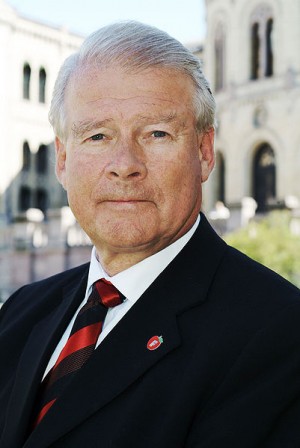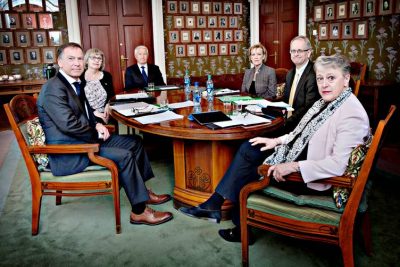The conservative Progress Party’s decision to ultimately nominate their former leader Carl I Hagen for a seat on the Norwegian Nobel Committee has set off a storm of opposition. That’s because the 73-year-old Hagen, who couldn’t bring himself to fully retire from politics, remains a substitute Member of Parliament, and many contend that political position disqualifies him from Nobel Committee membership.

Hagen also has a long track record of being opposed to immigration, unsympathetic to the plight of refugees and firmly opposed to foreign aid. He’s not widely viewed as someone who should help decide who wins the Nobel Peace Prize. “Carl I Hagen has no background in foreign policy, and could damage the Nobel Committee’s reputation internationally if he’s elected,” claimed the Norwegian Nobel Committee’s former secretary, Professor Geir Lundestad, to state broadcaster NRK.
It’s his ongoing political involvement both at the local and national level, though, that’s at the heart of a huge fuss over his Nobel nomination. Even the current director of the venerable Nobel Institute itself fired off a strong objection on Thursday. Olav Njølstad, who also serves as secretary to the Norwegian Nobel Committee, told NRK that the Progress Party has shown “a lack of respect and understanding for the committee’s work” by nominating Hagen.
“If the principle about the Nobel Committee’s independence (from Norwegian policy makers) is to be upheld, a representative of Parliament should not sit on the committee,” Njølstad told NRK. He said it would also “become very unclear and difficult” if any exception was made for substitute MPs “who most probably would need to meet in Parliament during the course of their term.” That would not only disrupt the committee’s work but, in Njølstad’s view, be inappropriate as well.
Njølstad went on to call it “an intolerable situation” if an MP is involved in discussions of a Peace Prize winner “while we insist to the rest of the world that the committee is completely independent of Parliament and Norwegian authorities. That simply can’t happen, and I think most people would understand that.”

The Progress Party is entitled to choose a candidate for a seat on the committee since, under the terms of benefactor Alfred Nobel’s will, the committee awarding the Peace Prize is supposed to reflect the make-up of Parliament. The Progress Party won enough representation in Parliament at the last election to maintain the seat it currently has. It’s held by another former Progress Party politician, Inger-Marie Ytterhorn, who had expressed a desire to retain it for another term.
Now her own party fellows want to replace her with Hagen. “That would put the Nobel Committee in a hopeless situation,” Ytterhorn, long retired from active politics, told NRK Thursday afternoon. “The committee would no longer be an institution independent of Parliament.”
Not only is she upset by her pending ouster, so is Njølstad, the administration of the Parliament, longtime Nobel Peace Prize critic Fredrik Heffermehl and the Nobel Peace Prize Watch organization, and a long string of Parliamentarian leaders. They all cite, among other things, established practice that’s been followed since 1977, that no sitting Member of Parliament can become a member of the Nobel Committee. The ban on MPs being appointed to the committee was meant to enforce the independence of the Nobel Committee’s work in deciding who wins the Nobel Peace Prize, and stress that neither the Parliament nor the Norwegian government has anything to do with choosing Peace Prize winners.
Reversing a trend away from politicians as members
While there’s a long tradition of parties rewarding former leaders, government ministers, MPs or other party faithful with a seat on the committee, there’s also been a growing trend of appointing new members who have no formal or lengthy political background. Now the Progress Party seems to be reversing that trend, even though it has earlier stressed the importance of distance between the Parliament and the Nobel Committee itself. Hagen was keen on becoming a member when he initially retired from Parliament in 2011. He was highly offended and claimed he’d been “humiliated” by his party fellows when they failed to nominate him. It didn’t take long before he missed the political limelight and made a comeback in city politics.
It’s unclear what led the Progress Party to change its mind about Hagen, knowing full well his nomination would set off massive protests because of his political record and conflicting parliamentary role. Objections were rolling out all day on Thursday, with the administration of the Parliament itself claiming that it’s “not natural” to differentiate between an MP and a substitute MP.
It’s up to the full Parliament to actually vote on who the parties nominate for a Nobel Committee seat, leaving Hagen to face historic opposition. Both Jonas Gahr Støre, leader of the Labour Party, and Audun Lysbakken, leader of the Socialist Left Party have said the issue must be debated by the Parliament as a whole.
‘Sends a bad signal’
“For me, it now seems unclear whether someone can sit on the Nobel Committee if they end up sitting in Parliament at the same time, and thus represent the national assembly,” Støre told DN. He sent a letter on Thursday to all the other leaders of parliamentary groups, asking them to stand by the decades-long practice of not choosing representatives of Parliament as members of the Nobel Committee. Støre and others stress they’re objecting to Hagen’s Nobel nomination as a matter of principle, not to Hagen personally. MP Abid Raja of the Liberal Party also objects to a substitute MP being allowed to sit on the Nobel Committee, saying it “sends a bad signal to the world.”
Hans Andreas Limi, the Progress Party’s parliamentary leader, claimed that Hagen would be a “valuable” member of the committee, given his “background and experience,” without mentioning why the party was willing to dump Ytterhorn and set off so much fuss to accommodate Hagen. Hagen himself wouldn’t comment on his nomination, other than to say he appreciated his party’s confidence in him. Progress Party leader Siv Jensen, meanwhile, was unusually absent from the debate. She was widely believed to have blocked Hagen’s earlier attempt to secure a Nobel nomination, when Ytterhorn was retained.
One of Hagen’s close party allies, Christian Tybring-Gjedde, claimed to DN that “some people” were merely searching for “formal reasons” to hinder Hagen from being elected to the committee. “I fully support Carl I Hagen as a member of the Nobel Committee,” Tybring-Gjedde said. “It can’t make things so much worse on the Nobel Committee than it already has been, regardless. There have been many strange Peace Prizes dealt out.”
newsinenglish.no/Nina Berglund

